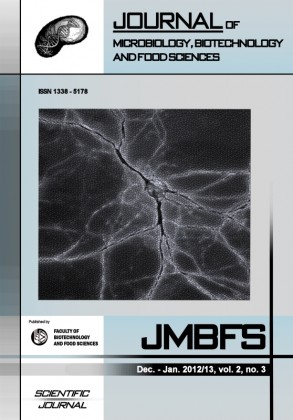MARKET BASKET SURVEY FOR SOME PESTICIDES RESIDUES IN FRUITS AND VEGETABLES FROM GHANA
Keywords:
Pesticide residues, fruits, vegetables, maximum residue limit, GhanaAbstract
A study was conducted to investigate the organochlorine, organophosphorus and synthetic pyrethroid pesticide residues in fruits and vegetables from markets in Ghana. For this purpose, a total of 309 fruits and vegetable samples, were collected and analyzed by gas chromatography with electron capture detector. The obtained results showed that the predominance of organochlorine followed by organophosphorus and synthetic pyrethroid pesticides in most of the analyzed samples. The detected concentrations of them were most significant in vegetable samples. The results obtained showed that 39.2 % of the fruits and vegetable samples analyzed contained no detectable level of the monitored pesticides, 51.0 % of the samples gave results with trace levels of pesticide residues below the maximum residue limit (MRL), while 9.8 % of the samples were above the MRL. The findings point to the urgent need to establish reliable monitoring programs for pesticides, so that any exceedance in concentration over environmental quality standards can be detected and appropriate actions taken.Downloads
Download data is not yet available.
Downloads
Published
2012-12-03
How to Cite
Kofi Bempah, C., Asomaning, J., & Boateng, J. (2012). MARKET BASKET SURVEY FOR SOME PESTICIDES RESIDUES IN FRUITS AND VEGETABLES FROM GHANA. Journal of Microbiology, Biotechnology and Food Sciences, 2(3), 850–871. Retrieved from https://office2.jmbfs.org/index.php/JMBFS/article/view/7131
Issue
Section
Food Sciences
License
Copyright (c) 2012 Crentsil Kofi Bempah, Jacob Asomaning, Juliana Boateng

This work is licensed under a Creative Commons Attribution 4.0 International License.
All papers published in the Journal of Microbiology, Biotechnology and Food Sciences are published under a CC-BY licence (CC-BY 4.0). Published materials can be shared (copy and redistribute the material in any medium or format) and adapted (remix, transform, and build upon the material for any purpose, even commercially) with specifying the author(s).

